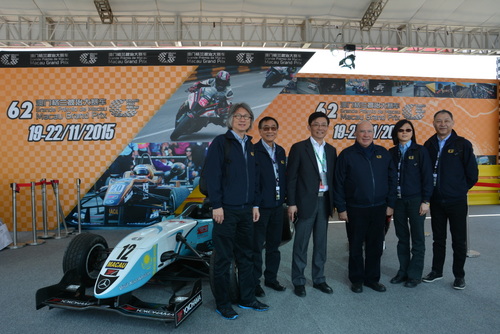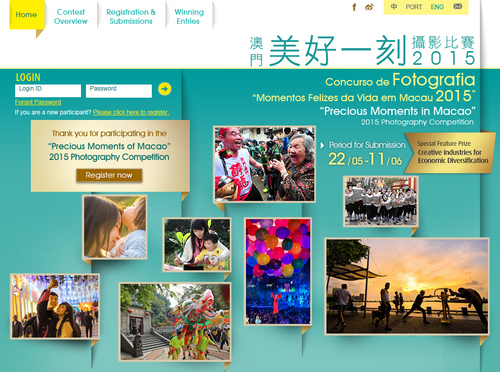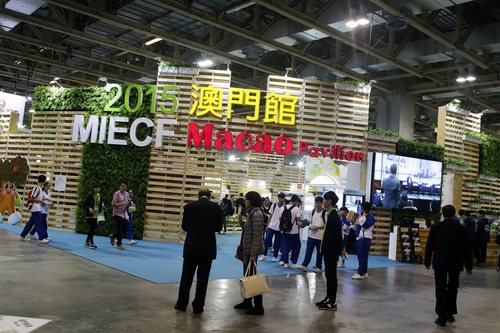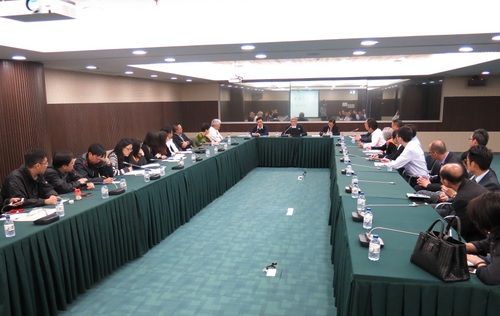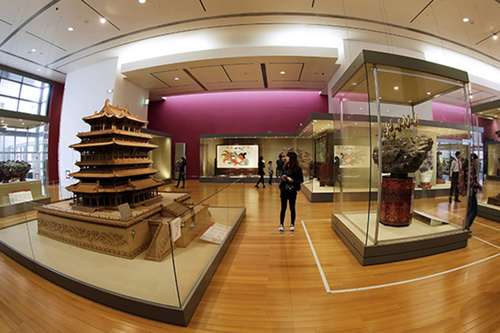Macao SAR Government Portal
News
Macau Grand Prix Promotion at Chinese F1 Grand Prix in Shanghai
A Macau Grand Prix promotion, organised by The Macau Grand Prix Committee in conjunction with the Macau Government Tourist Office, was held at the Chinese F1 Grand Prix in Shanghai from April 10 to 12. The promotion was located at the Fountain Plaza at the Shanghai International Circuit. The Macau Grand Prix Committee and the Shanghai International Circuit enjoy close cooperation and, over the years, the Committee has been regularly invited to participate in activities surrounding the Chinese F1 Grand Prix, including the on-site booth through which to promote the Macau Grand Prix. Last year, according to data collected during the Macau Grand Prix, Shanghai netizens were the second most active on the official website after those in Guangdong Province. Through its promotions during the Chinese F1 event, the Macau Grand Prix Committee hopes to attract more fans to the Macau race and to further strengthen ties with the Shanghai track in order to jointly promote motorsport. This year the exhibition had the theme of ‘passion for road racing’ with the signature yellow and black of the Guia Circuit’s famous Armco barriers. One picture exhibit showed the thrilling track battles for glory, while a second documented the history of the event. The promotion also featured the winning car of Daniel Juncadella from the 2011 Formula 3 Macau Grand Prix, and John McGuinness’ 2001 Macau Motorcycle Grand Prix-winning motorcycle. In addition, visitors had a chance to experience the thrills of the Guia street circuit for themselves on the simulator. The booth included message boards where visitors were encouraged to leave their comments about the event. According to data provided by the Chinese F1 Grand Prix organisers, 125 thousand spectators were recorded over the three day event. Members of the Macau Grand Prix Committee visited the Shanghai International Circuit, while the exhibition was visited by CEO of the Shanghai Juss Event Management Co Ltd, Mr. Jiang Lan.
…
Submissions for “Precious Moments in Macao” Photography Competition invited from 22 May
The “Precious Moments in Macao” 2015 Photography Competition’s online portal is now open. Participants may submit their works online from 22 May 2015. This year’s competition has a special feature prize entitled “Creative Industries for Economic Diversification”. The aim of the competition is to chronicle the developments and events of Macao over the past year, and to select a suitable photo to be the cover of the Macao Yearbook, which is published by the Government Information Bureau. The competition is co-organised by the Government Information Bureau, eight photography organisations and five media associations. Submitted photos should depict changes in the cityscape and the bright side of people’s lives over the past year to underscore Macao’s best qualities. Since the introduction of the competition’s online portal, the response from participants has been overwhelming, drawing outstanding works on a variety of themes. This year the theme of the special feature prize under the competition is “Creative Industries for Economic Diversification”. The cultural and creative sector has been the main focus of the Macao SAR Government’s economic growth strategy in recent years. The fledgling sector has been thriving under a series of supporting policies. Submitted works may cover the creation or production process of Macao’s cultural and creative industries or the display, exhibition and viewing of their products, in order to showcase the diversity, innovation and vitality of this sector. Anyone wishing to enter can visit the website http://photo.gcs.gov.mo to register and upload their works from 22 May (00:00) to 11 June (24:00). Winners of the First, Second and Third Prizes in the “Precious Moments in Macao” 2015 Photography Competition will receive cash prizes of 8,000 patacas, 5,000 patacas and 3,000 patacas respectively, in addition to a trophy. A total of up to 50 Merit Prizes will also be awarded and their winners will each get a certificate as well as a cash prize of 500 patacas (Note: the final number of merit prizes will depend on the standard of competition entries). In addition, the Editorial Committee of the 2015 Macao Yearbook will select from the entries the winner of the Yearbook Cover Award, who will receive a cash prize of 5,000 patacas, and winners of the Special Feature Prize will each receive a cash prize of 1,000 patacas (the actual number of winners will depend on the number of suitable entries). This year’s competition has a new co-organiser – the Macao Association of Sports Reporters, bringing the total number of co-organisers to 13 and making the judging panel stronger. The 13 co-organisers are: the Photographic Society of Macao, Photography Salon Society of Macao, Macao Association for the Promotion of Photographic Art, Macao Association of Photographers, Macao Multimedia Photographic Art Association, Macao Association of Photographic Art, Macao Camera Lens Art Association, Macao Digital Photography Association, Macao Media Workers Association, Macao Journalists’ Club, Macao Journalists’ Association, Macao Media Club, and Macao Association of Sports Reporters (listed in no particular order). Winning works and outstanding entries will be featured in a public exhibition, including entries to be used as the cover of the 2015 Macao Yearbook and its full-page illustrations. All photography aficionados are welcome to take part. Information pamphlets about the competition are available from the 13 co-organisers; Princess Photography Equipment; Nice Photography Equipment; Foto Digital Fantastic; Digital Hang Seng; Foto Digital “Ieng Fo”; Digital Chi Pak; the Government Information Centre; IACM libraries and activity centres; Cultural Affairs Bureau libraries; DSEJ education centres; the University of Macau; Macau University of Science and Technology; Macao Polytechnic Institute; Institute of Tourism Studies; Academy of Public Security Forces; University of Saint Joseph; City University of Macau; Kiang Wu Nursing College; Macau Institute of Management; Macao Centre of Continuing Studies; and the Macao Association of Civil Servants. Judging will take place on 28 June 2015.
…
Photos of 2015 MIECF in “MSAR News”
A collection of photographs taken at the 2015 Macao International Environmental Co-operation Forum & Exhibition (MIECF) is now available in the government news application “MSAR News”. The collection of 10 photographs, titled “The Green Public Day of the 2015 MIECF” taken by Government Information Bureau photographer Vitor Ng Alves, show activities of the forum held under the theme “Waste Reduction at Source Starts with Me”. There was also a string of themed workshops, games booths, stage performances and magic shows aimed at promoting awareness on environmental protection and the importance of caring for the environment. MIECF is the green forum initiated by the Government of the Macao Special Administrative Region, with a strategic aim to nurture environmental business, technology and information exchange between the Pan-Pearl River Delta Region the international markets. Since its beginning in 2008, MIECF has gained increasing popularity among industry professionals and was recognised by the Global Association of the Exhibition Industry (UFI) as a “UFI Approved Event” since 2011. For more photo collections, users of portable devices can search and download this app by the keyword “MSAR News” in App Store or Google Play.
…
Tax deduction for environmental-friendly vehicles tightened
Effective today, environmental-friendly motor vehicles will have to meet higher emission standards in order to be eligible for tax deduction, according to the SAR Gazette. Under the new arrangement, only 88 of the previously allowed 134 models are now eligible for a 50 per cent tax deduction, with a ceiling of 60,000 patacas. Purchases or orders made before 7 April will still get the earlier arrangement but transaction would have to be completed within 180 days from today: relevant documents have to be submitted to the Transport Bureau and the Financial Services Bureau. According to the Chief Executive despatch in the Gazette, the mileage of a “green” vehicle weighing 1,516 kg to 1,766 kg has increased to 15.5 kilometres per litre from 13.6 kilometres per litre, by both European and Chinese testing procedures. For more details of vehicle models, please visit the website of the Financial Services Bureau (http://www.dsf.gov.mo/?lang=en).
…
Consumer Council released latest‘Supermarket price survey’ Surveyed spots included over 10 supermarkets in N. Sra. de Fátima Parish
Consumer Council conducted its second ‘Supermarket price survey’ in April on 8 April for the implementation of Section 2b), Article 10, Law 4/95/M of 12 June. Surveyed locations included supermarkets near Iao Hon Market and the Border Gate area (Portas do Cerco ) in N. Sra. de Fátima Parish. The latest ‘Supermarket Price Survey’ is now available on Consumer Council’s website (www.consumer.gov.mo), and the ‘Supermarket Price Information Platform’ iPhone and Android apps. The survey is also available free of charge at the offices of Consumer Council, IACM’s Iao Hon and S. Domingos Markets, bookstores and libraries. Consumers may also access the resources through WAP channels on their mobile phones. With reference to the local six parishes and the number of supermarkets in each parish, the Council has divided over 100 supermarkets into 8 areas for price collection. The Council collects prices from these supermarkets for the provision of a more comprehensive database for consumers to check price discrepancies and make price comparisons according to their desired locations. For inquiry, please call 8988 9315.
…
Consumer Council announces top 5 cheapest supermarkets for Q1
In order to enhance the price comparison function in its ‘Macao Supermarket Price Information Platform’, Consumer Council now publishes the ‘Rankings for Supermarkets with Lowest Price’ quarterly, hoping to encourage supermarkets to further lower their prices for a higher position in the ranking list. Since launching both website and app versions of its ‘Macao Supermarket Price Information Platform’ in 2011, the Council has been optimizing the use and functions of the ‘Platform’ to allow consumers to access the price data faster and more easily. For consumers’ easy access to find supermarkets with the most number of lowest price items, the Council added the ‘Rankings for Supermarkets with Lowest Price’ function to its ‘Platform’ last year and compares prices of over 300 products collected from more than 100 supermarkets monthly to see which supermarket offers the most number of cheapest products. The Council notes that the ranking list helps to encourage most supermarkets to reduce prices for a better position in the ranking list. Besides publishing the ranking result monthly, the Council now further publishes the quarterly result through more channels, including releasing the top 5 supermarkets list in local newspapers for consumers’ information The Council indicates that more encouraging elements will be added to promote healthy competition between supermarkets and price reductions. Consumers are welcome to compare prices using the ‘Macao Supermarket Price Information Platform’. The QR code of the ‘Platform’ app is available at supermarkets for consumers to download. For enquiry, please call 8988 9315. ‘Rankings for Supermarkets with Lowest Price’ 2015 Q1 Top 5 supermarkets:
…
Commemorative envelope of “TAIPEI 2015-30th Asian International Stamp Exhibition”
Macao Post will participate the “TAIPEI 2015 - 30th Asian International Stamp Exhibition”, located at Taipei, during 24th to 28th April, 2015. To commemorate this Exhibition, Macao Post issues the commemorative envelopes and provides the commemorative postmark cancellation service on site of the exhibition. Be convenience to the philatelist, the commemorative envelope with stamp priced at MOP4.50 will also be available for sale at the Philatelic Shop of Macao Post Headquarters starting from 24th April. You may send your mail of this cancelled commemorative envelope at the following locations *: Philatelic Shop at Macao Post Headquarters: 24th April 9:00 – 17:30 Post Offices: 24th to 28th April Office Hours to Public * No commemorative postmark cancellation service will be provided in Macao.
…
Fraudulent (Phishing) Email of Macao Post EMS tricks the recipient to disclose address
Further to the communication about the fraudulent (phishing) email received by a citizen on March 27, 2015, Macao Post once again urges public to be vigilant and pay attention to an email written in English with an indication of EMS Logo that solicit the recipient to disclose address (please refer to the image for details). We have to clarify that Macao Post did not send the email concerned to their customers. Given the attached file “ems.zip” in zip format contains computer virus, public is advised not to download the file concerned.
…
Photos of handover gifts in government news app
The Government Information Bureau today posted a new photo collection titled “The Handover Gifts Museum of Macao”, which can be viewed at the government news mobile application “MSAR News”. The 10 photographs, taken by the Bureau’s photographer Vitor Alves, shows a different perspective of the Museum and the gifts from the State Council of the People’s Republic of China, country-wide provinces, municipalities, autonomous regions and Hong Kong Special Administrative Region. The Museum, adjacent to the Macao Museum of Art in NAPE, is also the area that was used for the ceremony on 20th December 1999, marking Macao’s return to the motherland. Construction started in March 2003 and was officially opened in December 2004. The three-storey Museum places display the precious handover gifts on the second floor. It is open every day except Mondays, between from 10 am to 7 pm. This app is available for both iOS (Version 5.1 or above) and Android (Version 4.0 or higher) systems. It can be searched and downloaded with the keyword “MSAR News” in App Store and Google Play.
…
Package tours and hotel occupancy rate for February 2015
Information from the Statistics and Census Service (DSEC) indicated that attributable to the Lunar New Year holidays, visitors on package tours increased by 13.2% year-on-year to 983,000 in February 2015; visitors arriving on package tours (673,000) accounted for 68.5% of the total, while those joining local tours shared 31.5%. Package tour visitors from Mainland China increased by 21.5% year-on-year to 804,000, with 418,000 coming from Guangdong Province. Visitors from the Republic of Korea (41,000) and Hong Kong (39,000) increased by 7.7% and 8.1% respectively year-on-year, whereas those from Taiwan (53,000) decreased by 12.0%. In the first two months of 2015, visitors on package tours reached 1,940,000, up by 16.8% year-on-year. Outbound residents using services of travel agencies were 135,000 in February 2015, up by 10.2% year-on-year; those travelling on package tours surged by 29.1% to 56,000, and the main destinations were Mainland China (80.7% of total), the Republic of Korea (5.2%), Taiwan (3.9%) and Hong Kong (3.4%). In the first two months of 2015, outbound residents using services of travel agencies totalled 247,000, up by 3.6% year-on-year. There were 97 hotels and guesthouses operating at the end of February 2015, providing 28,000 guest rooms, up by 1.0% year-on-year; 5-star hotels accounted for 65.2% of the total supply, with 18,000 rooms. A total of 756,000 guests checked into hotels and guesthouses in February 2015, down by 9.9% year-on-year. Guests from Mainland China (512,000) and Hong Kong (87,000) decreased by 6.4% and 16.2%. The average length of stay of guests held stable as February 2014, at 1.4 nights. On account of an increase in guest rooms and a decrease in guests, the average occupancy rate of hotels and guesthouses tumbled by 11.3 percentage points year-on-year to 80.2%, with 5-star hotels leading at 83.3%. In the first two months of 2015, hotel guests totalled 1,559,000, down by 8.9% year-on-year; the average occupancy rate stood at 79.8%, a decrease of 6.1 percentage points. Visitor-guests accounted for 66.5% of the total overnight visitors, down by 1.9 percentage points year-on-year.
…


